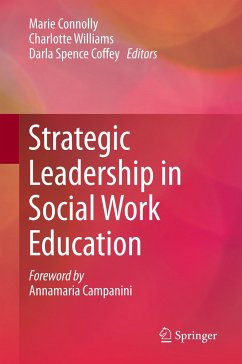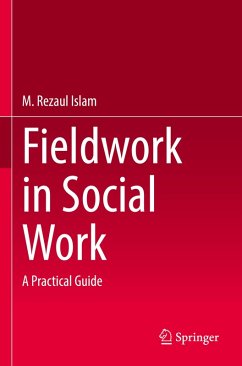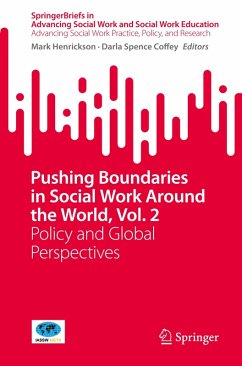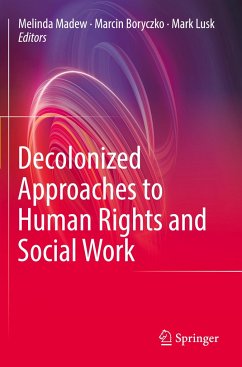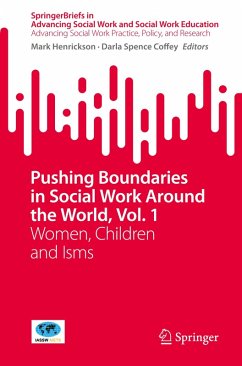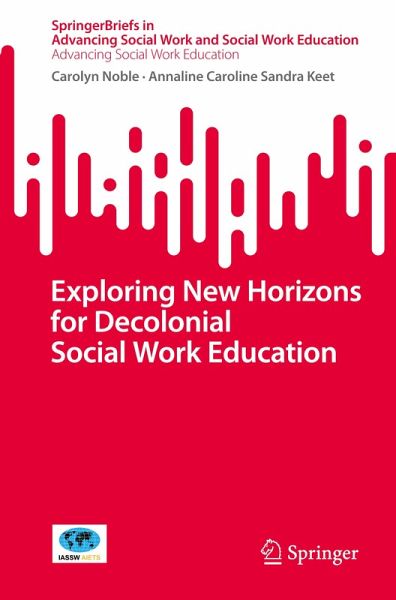
Exploring New Horizons for Decolonial Social Work Education

PAYBACK Punkte
19 °P sammeln!
This book presents current scholarship designed to decolonize, reform and confront the Euro-centric dominance in social work education and practice. This compact volume strings together new content from internationally recognised authors in the field of social work to address this need.Decolonising social work seeks to weaken the effect of colonialism and create opportunities to promote traditional practices in contemporary settings. Its focus is to draw attention to the effects of globalisation and the universalization of social work education, methods of practice and international developmen...
This book presents current scholarship designed to decolonize, reform and confront the Euro-centric dominance in social work education and practice. This compact volume strings together new content from internationally recognised authors in the field of social work to address this need.
Decolonising social work seeks to weaken the effect of colonialism and create opportunities to promote traditional practices in contemporary settings. Its focus is to draw attention to the effects of globalisation and the universalization of social work education, methods of practice and international development that fail to embrace and recognise local knowledges and methods by bringing new and fresh perspectives to social work. It can also be seen as a significant contribution to social work's more critical stance and long-standing struggle to challenge the hegemonic Euro-centric epistemology. With decoloniality becoming a global imperative, this collection brings together case studies from world scholars and decolonial voices in order to explore opportunities, challenges and trends to decolonize through culturally relevant curricula, including:
Social Work and Decolonisation: Student Social Workers' Understanding of the Concepts of 'Culture', 'Cultural Identity' and 'Decolonisation'Developing Curriculum for Criminal Justice Social Work from the FieldNew Directions in Trauma Work? Cultural Trauma Theory as an Instrument to Contextualise and Address Histories of Pain in Global Communities Analysing and Understanding Intersections: Using Nayak's 'Intersectional Model of Reflection' in Social Work TeachingDecolonizing Social Work Education and Curriculum Utilizing Cultural Competemility and Professionalism Approach
Exploring New Horizons for Decolonial Social Work Education is essential reading for practitioners, policy makers, instructors, researchers, and other social work professionals. The book may be used as a supplemental text for social work courses. The national and international focus of the volume will be highly relevant to all social work programmes across the globe.
Decolonising social work seeks to weaken the effect of colonialism and create opportunities to promote traditional practices in contemporary settings. Its focus is to draw attention to the effects of globalisation and the universalization of social work education, methods of practice and international development that fail to embrace and recognise local knowledges and methods by bringing new and fresh perspectives to social work. It can also be seen as a significant contribution to social work's more critical stance and long-standing struggle to challenge the hegemonic Euro-centric epistemology. With decoloniality becoming a global imperative, this collection brings together case studies from world scholars and decolonial voices in order to explore opportunities, challenges and trends to decolonize through culturally relevant curricula, including:
Social Work and Decolonisation: Student Social Workers' Understanding of the Concepts of 'Culture', 'Cultural Identity' and 'Decolonisation'Developing Curriculum for Criminal Justice Social Work from the FieldNew Directions in Trauma Work? Cultural Trauma Theory as an Instrument to Contextualise and Address Histories of Pain in Global Communities Analysing and Understanding Intersections: Using Nayak's 'Intersectional Model of Reflection' in Social Work TeachingDecolonizing Social Work Education and Curriculum Utilizing Cultural Competemility and Professionalism Approach
Exploring New Horizons for Decolonial Social Work Education is essential reading for practitioners, policy makers, instructors, researchers, and other social work professionals. The book may be used as a supplemental text for social work courses. The national and international focus of the volume will be highly relevant to all social work programmes across the globe.






